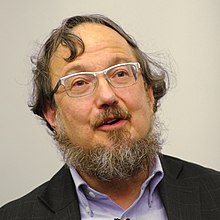Don Zagier
| Don Zagier | |
|---|---|
 |
|
| Born |
29 June 1951 Heidelberg, West Germany |
| Nationality | United States |
| Fields | Mathematics |
| Institutions |
Max Planck Institute for Mathematics Collège de France University of Maryland ICTP |
| Alma mater | University of Bonn |
| Doctoral advisor | Friedrich Hirzebruch |
| Doctoral students | |
| Known for |
Gross–Zagier theorem Herglotz–Zagier function |
| Notable awards |
Cole Prize (1987) Chauvenet Prize (2000) |
Don Bernard Zagier (born 29 June 1951) is an American mathematician whose main area of work is number theory. He is currently one of the directors of the Max Planck Institute for Mathematics in Bonn, Germany. He was a professor at the Collège de France in Paris, France from 2006 to 2014. Since October 2014, he is also a Distinguished Staff Associate at ICTP.
Zagier was born in Heidelberg, West Germany. His mother was a psychiatrist, and his father was the dean of instruction at the American College of Switzerland. His father held five different citizenships, and he spent his youth living in many different countries. After finishing high school (at age 13) and attending Winchester College for a year, he studied for three years at MIT, completing his bachelor's and master's degrees and being named a Putnam Fellow in 1967 at the age of 16. He then wrote a doctoral dissertation on characteristic classes under Friedrich Hirzebruch at Bonn, receiving his PhD at 20. He received his Habilitation at the age of 23, and was named professor at the age of 24.
Zagier collaborated with Hirzebruch in work on Hilbert modular surfaces. Hirzebruch and Zagier coauthored Intersection numbers of curves on Hilbert modular surfaces and modular forms of Nebentypus, where they proved that intersection numbers of algebraic cycles on a Hilbert modular surface occur as Fourier coefficients of a modular form. Stephen Kudla, John Millson and others generalized this result to intersection numbers of algebraic cycles on arithmetic quotients of symmetric spaces.
...
Wikipedia
